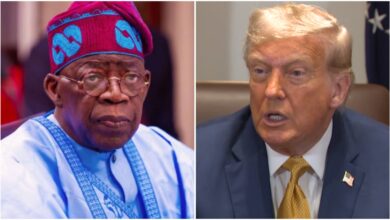Fuel War Brews: Dangote Urges Tinubu to Ban Fuel Imports, Marketers and Analysts Raise Alarm

Alhaji Aliko Dangote, President of the Dangote Group and owner of Africa’s largest refinery complex, has called on President Bola Tinubu to extend the “Nigeria First” policy to refined fuel—urging the government to ban the importation of petrol, diesel, and other locally produced petroleum products.
Nigeria First: Dangote Demands Fuel Sector Inclusion
At the Global Commodity Insights Conference on West African Refined Fuel Markets, Dangote argued that continuing fuel imports is undermining local refining efforts—jeopardising both his $20 billion refinery and broader domestic energy investment . Under the Nigeria First framework (introduced in May 2024), government agencies must avoid importing any goods already locally available, unless a waiver is justified by the Bureau of Public Procurement.
The Case against Imports: Dumping, Toxic Fuel, and Unfair Competition
Dangote accused importers of flooding the Nigerian market with cheap, often toxic fuel blends that would be unacceptable in developed markets like Europe or North America . He blamed the arrival of heavily discounted Russian-sourced fuels for distorting prices, forcing local refineries to sell below production costs—creating what he called “a completely unlevel playing field” .
Dangote Refinery: Proof of Capacity—And Net Exporter Status
Stressing that his refinery is robust and export-ready, Dangote revealed that Nigeria became a net exporter of refined petrol, shipping roughly 1 million tonnes—approx. 1.35 billion litres—in just 50 days (June–July 2025).
Marketers Push Back: Competition, Inflation, and Monopoly Fears
Representatives of the Independent Petroleum Marketers Association of Nigeria (IPMAN) and the Petroleum Products Retail Outlet Owners Association strongly disagreed with the proposal. Chinedu Ukadike (IPMAN) warned that banning imports would stifle competition, worsen inflation, and collapse the sector, especially since Dangote’s refinery alone cannot yet meet national demand . Meanwhile, Billy Gillis‑Harry cautioned against allowing a single entity to dominate downstream operations in a free-market economy.
Expert Opinion: Monopoly Risk and Energy Security
Professor Dayo Ayoade of the University of Lagos raised concerns about over-reliance on one refinery, calling the proposal a potential monopolistic threat. He argued that Nigeria must diversify fuel sources for both energy security and legal compliance with international trade norms.
Calls for Expansion of Local Refining
While marketers oppose the outright ban, many—including IPMAN and Prof. Ayoade—support Dangote’s broader call to accelerate local refinery development, urging regulators to revoke idle licencees and incentivise new capacity.
Bottom Line: A Fuel Policy Flashpoint
Dangote presents a bold vision of domestic fuel self-sufficiency—pointing to both export figures and local capacity to justify his call to ban imports. But critics warn that such a move risks establishing market dominance and shutting out competition still vital to stabilising price and supply. As Nigeria begins to feed neighbours with refined products, the tug-of-war between economic nationalism and open markets intensifies—setting the stage for a high-stakes policy showdown.





